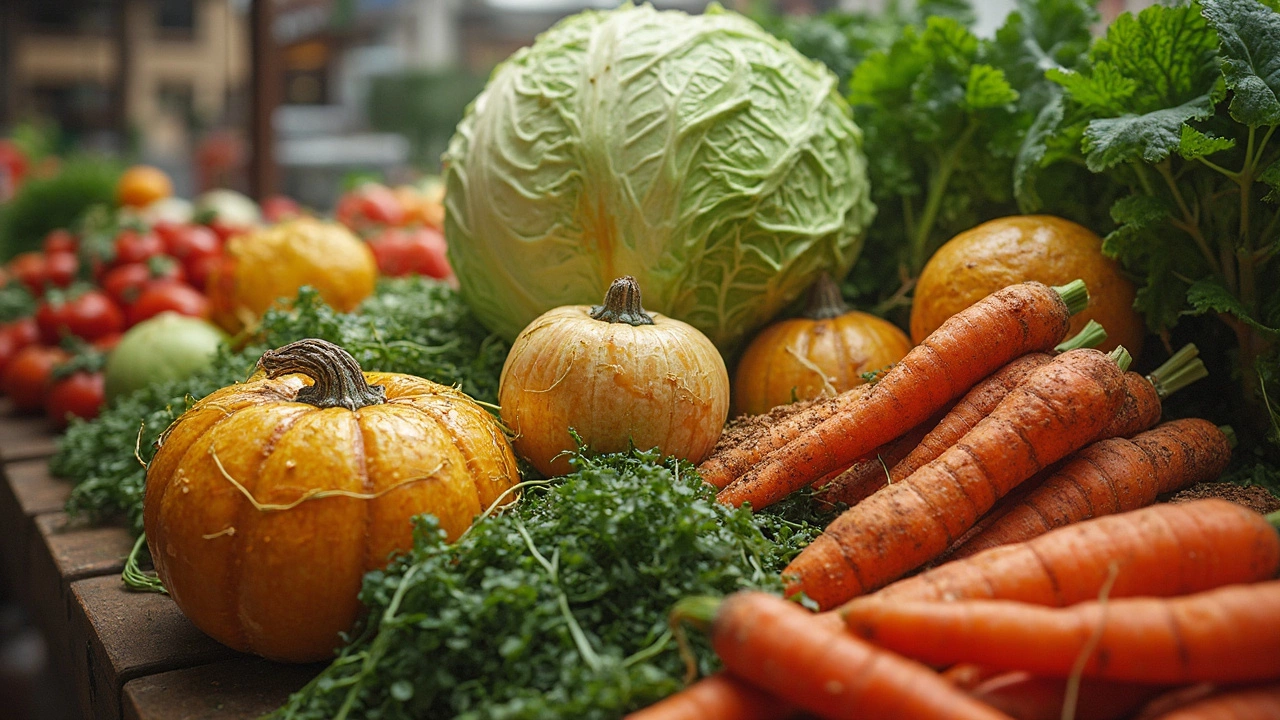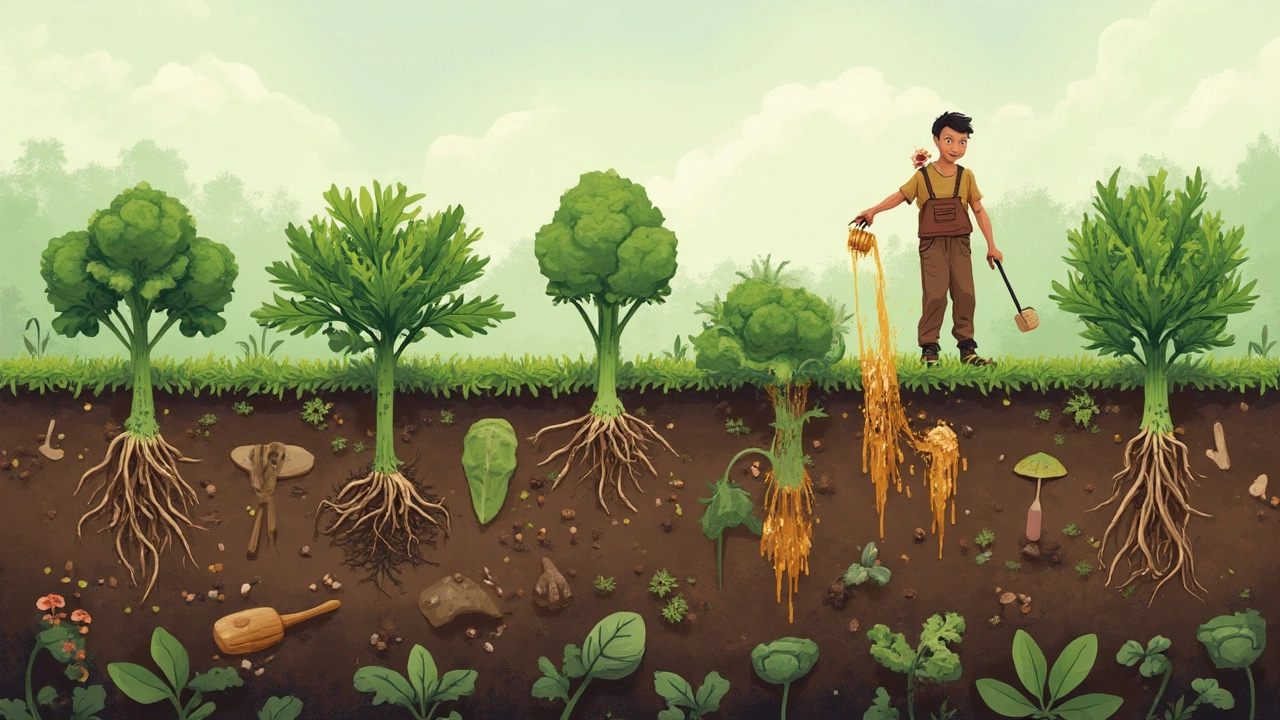
Here's something you might not know: not all vegetables on your plate are vegan. Shocking, right? Although vegetables are plants, the way they're processed or grown might introduce non-vegan elements. This can be a real bummer for anyone trying to stick to a vegan diet faithfully.
Let's break down why some vegetables can't be considered vegan. It often comes down to the sneaky hidden ingredients used in their farming or packaging. Some fertilizers used in agriculture could contain animal products, or they might be grown using methods that harm animals. Plus, certain additives in canned or frozen veggies might include non-vegan components.
- Hidden Ingredients in Vegetables
- Farm Practices Affecting Vegan Status
- Tips to Identify Non-Vegan Vegetables
- Ensuring Your Diet Stays Vegan
Hidden Ingredients in Vegetables
You'd think a carrot is just a carrot, right? Well, there's more to the story. Some vegetables might seem innocent at first glance but could be hiding surprising non-vegan secrets. Let's uncover some of these tricky bits so you can keep your diet truly plant-based.
Animal-Based Fertilizers
Believe it or not, some veggies are grown using fertilizers that come from animal sources. Common fertilizers like bone meal, blood meal, and fish emulsion make plants grow better but compromise their vegan status. Farmers often use these to boost the soil's nutrients without realizing (or sometimes caring) how it affects the end product.
Processing Additives
When veggies get canned or frozen, they can be processed with additives that include animal-derived ingredients. Case in point: some canned green beans might contain preservatives that are not entirely vegan. Always check the label, folks! It's better to know what's in your can than assume it's okay.
Wax Coatings
Here's one more twist: those shiny apples at the grocery store? They might be coated with a wax that contains shellac, a product derived from insects. Not quite what you'd expect from everyday veggies, huh?
- Always read ingredient labels on packaged vegetables.
- Aim for organic products when possible; they're less likely to have animal-based fertilizers.
- Support local farmers who practice cruelty-free farming methods.
Staying informed and curious can help ensure that the vegetables on your plate are truly vegan. Keep questioning, keep learning, and feel confident in your vegan food choices!
Farm Practices Affecting Vegan Status
When we think about vegan food, especially vegetables, we'd like to believe they're always safe for plant-based diets. But, believe it or not, some farming practices can turn a seemingly green vegetable into something questionable for vegans.
One big concern is the use of animal-derived fertilizers. Farmers sometimes use bone meal or fish emulsion, which are made from animal by-products, to enhance soil fertility. While it's great for growing robust plants, not so much for maintaining a strict vegan diet.
Unexpected Inputs
Then there's the issue of pest control. Some organic and conventional farms might use animal-derived pest control options. For example, organic slug pellets sometimes contain ingredients that are not vegan-friendly.
Another less obvious practice is the use of bee-dependent pollination. While it doesn't involve direct animal harm, bee exploitation raises ethical questions. We rely heavily on bees to pollinate crops like almonds and cucumbers, and this use relies on controlled bee populations.
Fish Bladder Filtration?
And if that wasn't enough, some farms use isinglass, a substance derived from fish bladders, for water filtration processes in hydroponic farming.
With all these factors in mind, as a vegan consumer, it's essential to consider where and how your veggies are grown. Checking labels, researching brands, and asking farmers directly can help ensure your diet stays truly plant-based.

Tips to Identify Non-Vegan Vegetables
Picking truly vegan vegetables can sometimes feel like navigating a minefield. It's essential to stay vigilant and equip yourself with the right knowledge. So, what should you look out for to make sure your veggies are actually vegan? Here are some practical tips to help you out.
1. Check the Labels
Always start by reading the labels if you're buying packaged veggies. Look out for non-vegan additives like gelatin or casein. These might pop up in unexpected places, especially in pre-packaged salads or frozen veggies.
2. Investigate Farming Techniques
Be aware of the farming practices used for your produce. Some vegetables are grown using fish emulsion or bone meal fertilizers, which aren't vegan. When in doubt, opt for organic or sustainably farmed vegetables, as these are less likely to use animal-derived products.
3. Ask Questions
Don't hesitate to ask questions at your local farmers' market or grocery store. Inquire about the farming and processing methods. Most sellers won't mind explaining where their produce comes from and how it’s grown. This helps ensure that the vegetables align with your vegan standards.
4. Be Wary of Waxes
Many fruits and veggies have a wax coating to make them look shiny and appealing. These waxes can contain shellac (a resin made from the secretions of the lac beetle) and may not be vegan. Look for veggies labeled as unwaxed or organic to avoid this issue.
5. Keep a Cheat Sheet
Consider keeping a small list of non-vegan compounds to watch out for—like isinglass or certain colorants—and refer to it when shopping. This will make it easier to spot any red flags.
With these tips in mind, you can confidently navigate the produce aisle, ensuring your vegetable choices remain consistent with your vegan lifestyle. Happy shopping!
Ensuring Your Diet Stays Vegan
Keeping your diet fully vegan involves a keen eye on the ingredients list and knowing exactly where your veggies come from. It’s surprising how certain sneaky non-vegan elements can slip into your meals, so it's worth being cautious.
Read the Labels
Labels are your best friends here. Always check for sneaky animal-derived ingredients like gelatin or casein in packaged goods. Sometimes, even vegetables in cans come with added preservatives or flavorings that aren't plant-based.
Know Your Local Farmers
Getting to know local farmers at your farmer’s market is a fantastic way to understand the vegetables you're eating. You can ask about their farming practices, ensuring they align with vegan principles. But remember, just because it’s local doesn’t mean it’s automatically vegan-friendly.
Look for Certified Vegan Products
When in doubt, look for vegan certification on products. This certified label helps confirm that the farming and production processes strictly adhere to vegan standards. It’s a quick way to ensure peace of mind as you shop.
DIY Can be a Game Changer
If you're up for it, growing your veggies can eliminate all doubts! This way, you control exactly what goes into growing your food, keeping those pesky non-vegan elements entirely out of the loop.
These steps might seem a bit much at first, but every conscious choice adds up. Being vigilant means you’ll keep enjoying truly vegan meals without any unwanted surprises!





